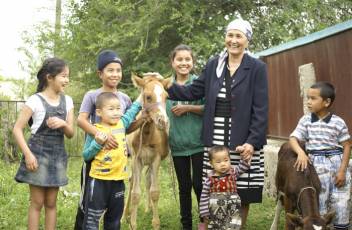 HelpAge International’s CEO, Toby Porter, has previously written about “daring to dream about Sustainable Development Goals being for people of all ages, including those in older age”.
HelpAge International’s CEO, Toby Porter, has previously written about “daring to dream about Sustainable Development Goals being for people of all ages, including those in older age”.
I have just returned from New York where I attended the last – thirteenth – session of the Open Working Group on the Sustainable Development Goals.
At times it seemed there would be no agreement on the goals, and civil society worried the doors might be closed to them by Member States who were in intense negotiations right until the end. It’s been a long haul, but we are nearer to our dream being a reality. I am so pleased to be able to say that age is in the proposed framework and goals, and we must keep it there.
Goals and targets include age and older people
The final outcome was adopted by Member States on Sunday; after many long hours and late nights. The full outcome document can be downloaded here.
In contrast to previous global development agreements, the proposed set of goals and targets now include age, the commitment to disaggregate data by age, and the words “older people”.
By September 2015 this document should be the basis for the Sustainable Development Goals. In the end the document’s commitment to deliver for “all” and to ‘’leave no one behind” became a core ambition. This is to be welcomed, as it explicitly includes all ages. But the work starts now to ensure this stays in the minds of governments and citizens.
Commitment to “leave no one behind”
At the beginning of the Open Working Group process, 18 months ago, age struggled to get a mention, let alone be included in the core policies we were promoting, such as social protection and health. We did a lot of awareness raising, talking to people and providing evidence.
Age and age-related targets are now mentioned in nine of the 17 goals and in the document’s introduction. We’re especially encouraged to see commitments in the introduction and goal number 17 to disaggregate data by age and to “leave no one behind”.
It has been a great experience working so intensively within the United Nations system to help bring off this result.
Secrets of our success
Some of the issues that seem to me to be fundamental to this success are:
- Working together with others as the “stakeholder group on ageing”, combining the HelpAge network and the NGO Committee on Ageing in New York. This has strengthened our reach and voice and has increased understanding of the importance of age. You can see an example of a stakeholder statement we have used here.
- Having clear positions on what we want to see in the framework and being committed to responding quickly nationally and globally.
- Making new partnerships: It has been really inspiring to do events focused on age with groups working with children and youth, women’s groups and others. Here is an example of a statement made at a recent event we hosted.
- Having the voice and presence of older people within the UN and at regional and national consultations and meetings. This will become even more important in the upcoming negotiations which will focus on citizen accountability.
- Working with HelpAge’s Affiliates to take our issues to government and civil society networks.
What next?
Yet, there is still more learning and analysis to be done. Next, we want to strengthen our partnerships, deepen our conversations and ensure that older people continue to inform the process which leads to the final Sustainable Development Goals.
We will all need to make sure age is included as a central theme in Member States positioning on the goals and in future reports of the UN Secretary General. The Secretary General’s synthesis report is due by the end of 2014. This will form the basis of national negotiations and engagement with the recommended Sustainable Development Goals and it must reflect age and older people’s issues.
The Global AgeWatch Index, with its four domains and thirteen indicators, is a specific contribution to the data discussion, and will support a dialogue with Member States on measuring how they are doing on ageing.
As we have said before, the process is not at all over. But for now we can definitely celebrate!
Read more about our work on the Sustainable Development Goals.
